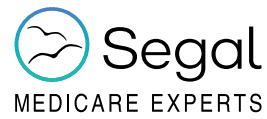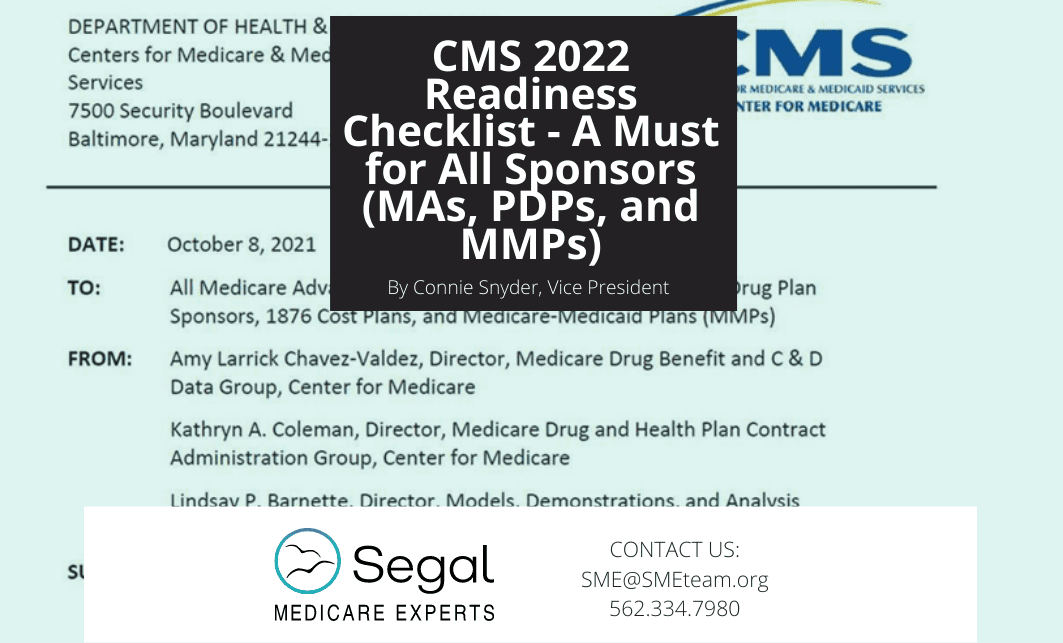CMS 2022 Readiness Checklist – A Must for All Sponsors (MAs, PDPs, and MMPs)
Written by Connie Snyder.
CMS Released 2022 Readiness Checklist with a Stern Call for Immediate Action
The Centers for Medicare & Medicaid Services (CMS) released the 2022 Readiness Checklist with expectations for full compliance in 15 major areas “prior to the 2021 Annual Election Period (AEP) and coverage beginning January 1, 2022.”
CMS Requires Policies & Procedures and Implementation — “A Must”
CMS may at any time request policies and procedures and evidence of implementation for items in the 37-page checklist. The introduction reminded all Sponsoring Organizations (SOs), which includes Medicare Advantage Organizations (MAOs), Prescription Drug Plan Sponsors, 1876 Cost Plans, and Medicare-Medicaid Plans (MMPs) that, “Organizations must notify their account manager(s) of any requirements that are at risk or where technical assistance is needed to resolve any issue.” Who is reviewing your policies to ensure compliance with the 15 areas (listed below) in the CMS 2022 Readiness Checklist?
It is Time to Add “Racial Equity” into Policies, Procedures, Programs, Training, and Activities
CMS included information regarding “alignment with Executive Order 13985 (Advancing Racial Equity and Support for Underserved Communities Through the Federal Government.” Is your organization addressing health disparities and ways to prevent, detect, and correct them? Are you adding information into your policies and procedures and implementing activities to ensure Racial Equity in your health care programs and activities? Are you communicating this to your staff and providers? If you need help do you know what resources are available?
Best Practices
Review and update current policies and procedures (P&Ps) to ensure they include the most recent guidance from CMS. This can be a massive undertaking! At a minimum, review the policies and procedures for the following major areas which CMS included in their Readiness Checklist:
1. Access to Services and Information
2. Individuals with Disabilities – Accessible Formats and Use of TTY Numbers
3. Precluded Providers and Prescriber
4. Systems, Data, & Connectivity
5. Reporting
6. Contracting, Subcontractor Provisions, and Oversight
7. Customer Service
8. Communications Consistent with C.F.R. 422 and 423 Subparts V
9. Enrollment/Disenrollment
10. Benefits Administration and Beneficiary Protections
11. Low Income Subsidy (LIS) and Best Available Evidence
12. Coordination of Benefits (COB) and Automatic True Out-of-Pocket Cost (TrOOP)
13. Grievances, Initial Coverage/Organization Decisions, and Appeals
14. Compliance Programs
15. Public Health Emergencies and States of Disaster
Start Including “Racial Equity” and Health Disparities – Ensure that your policies and procedures address health disparities and Racial Equity; and, ensure implementation of these into your organization prior to an audit.
Train and retrain your staff and providers – Staff turnover in your organization and the provider organizations can cause knowledge and implementation gaps. Develop good training materials and share them frequently.
Provide simple Job Aids for some of the new or more confusing requirements. Training is never really finished. Frequently repeating training sessions and/or distributing periodic tests can help your staff provide excellent service within the scope of their work. It can also ensure appropriate implementation and documentation as will be required during a CMS audit.
Schedule an Audit– Ask your Compliance Team to conduct an audit of your organization to ensure the P&Ps are fully implemented and that there is demonstrable evidence of compliance (which will be requested by CMS during audits). The old adage still holds true and is quoted repeatedly by auditors, “If it isn’t documented, it didn’t happen!” If you do not have the time or staff to conduct a self-audit, hire a third-party with Medicare expertise to conduct a review of your P&Ps and/or audit your implementation in the areas above.
Using a third party with Medicare auditing expertise has been found to reduce the organization’s audit findings/deficiencies, improve scores, and reduce Civil Monetary Penalties that CMS can issue for poor audit results and high beneficiary impact.
If you have questions or need assistance with any of the above, or need more information about this guidance or a mock audit, please contact:
Segal Medicare Experts
SME@SMETeam.org or 562.334.7980
Resources: CMS 2022 Readiness Checklist; Executive Order 13985 (Advancing Racial Equity and Support for Underserved Communities Through the Federal Government); https://www.cms.gov/About-CMS/Agency-Information/OMH/equity-initiatives/Health-Equity-Technical-Assistance.

